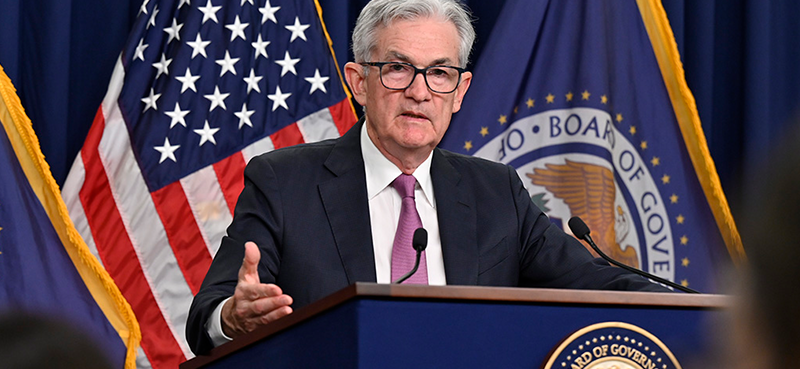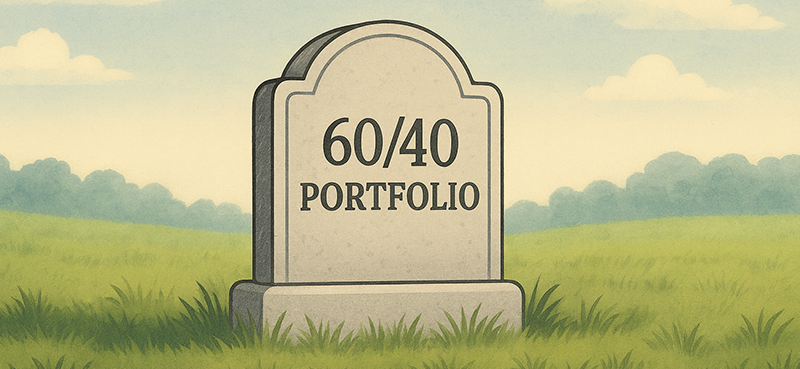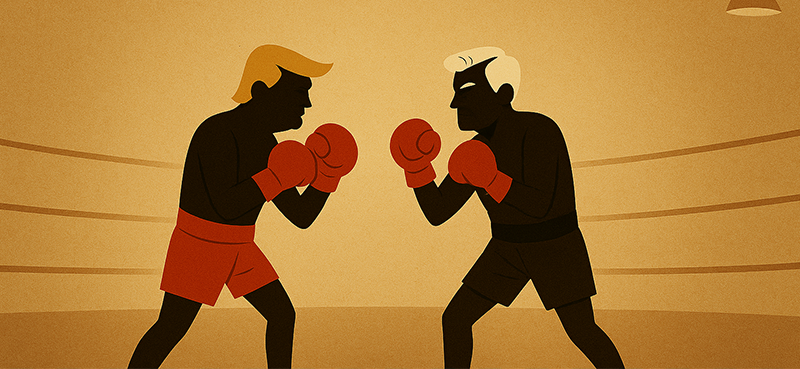Daniel Creech
Powell is lying about the Fed’s inflation target
Frank is out of the office on a personal matter, leaving me—Daniel—behind the mic.
Yesterday, the Fed hiked interest rates by 0.5%. During his followup Q&A, Fed Chair Jerome Powell said there are no plans to raise the inflation target from the current 2%. I explain why the markets sold off during his speech… why a surge in unemployment is inevitable… and why I believe Powell is outright lying (and will be forced to eat his words) about the Fed’s inflation target.
In other news, the U.S. Senate Committee on Banking, Housing, and Urban Affairs held a hearing yesterday on the FTX collapse. One of its witnesses was Kevin O’Leary, the celebrity investor known as “Mr. Wonderful.” I recap the hearing… how O’Leary is acting as an FTX spokesperson… and the important factors he glossed over in his testimony.
Wall Street Unplugged | 984
Powell is lying about the Fed’s inflation target
Announcer: Wall Street Unplugged looks beyond the regular headlines heard on mainstream financial media to bring you unscripted interviews and breaking commentary direct from Wall Street right to you on Main Street.
Daniel Creech: You’ve made a great decision to join us on the Wall Street Unplugged podcast for this Thursday, December 15th. I’m your guest host, Daniel Creech, research analyst here at Curzio Research. Yes, I’m the one filling in for and working alongside the one and only Frank Curzio, who is out of the office on a personal matter right now, and because of other scheduling conflicts, I’m actually recording this later on Wednesday, so we’re going to appear into the future.
Daniel Creech: But have no fear, I have a couple of very important topics I want to break down for you. The Federal Reserve meeting was today and the Fed came out, raised interest rates, and then Fed Chair Jerome Powell’s Q&A that followed, I took several notes, I took the time and effort to listen to that so you don’t have to, and you can just catch the CliffNotes version. I’ll keep you up to date and let you know what stood out to me on that.
Daniel Creech: Then secondly, earlier this week, there was a hearing with the now-current CEO of FTX talking about the mismanagement, and for lack of a better word, failure on FTX and why. But on Wednesday there was a Banking, Housing, and Urban Affairs Committee hearing titled Crypto Crash: Why the FTX Bubble Burst and the Harm to Consumers. I’m going to go over that. I watched the video, the recording because it was actually on at a different time when Frank and I were doing the podcast for earlier this week. But I want to highlight a couple of the witnesses there, a couple of the back-and-forth on the politician side that it was very similar to the first FTX hearing. But anyway, I’ll share with you what stood out on that, kind of a macro and big-picture item there.
Daniel Creech: If you listen to our Wednesday episode of Wall Street Unplugged where Frank and I were going back and forth about the upcoming Fed meeting, we basically didn’t expect anything out of the ordinary. We thought that the Fed would raise it 50 basis points. That is a step down from the 75 basis points they’ve done several times in a row. That’s exactly what happened, and the market reacted, the market sold off. I was taking notes at this and the market was up. I’m just saying the Dow was up over 200-some points, NASDAQ and S&P as well all up. Then as soon as the announcement for the rate hike came in, markets sold off just in a straight line. We went from up over 200 on the Dow to down over a hundred, I believe, very, very quickly.
Daniel Creech: Then to start, let’s see here. Powell’s Q&A started, and the Dow was down 117 points, Nasdaq was down 70, and the S&P down 20. When he took a question about over halfway through the Q&A, the Dow went down to over 300, the NASDAQ down 150, and the S&P down over 40, so things kept selling off as he was answering questions. I’ll get to that in just a second. But then, because Frank and I called this, it was going to be a traders’ market, and if you’re going to look at this, the only way to look at this is in the short-term stuff because nothing the Fed did today in raising interest rates, or yesterday, excuse me, changes the outlook for the markets over the next several months. This is all just right before the holidays, tight trading sessions, a lot of just traders’ mentality.
Daniel Creech: If you want to play that game, that’s fine, but most individual investors that aren’t short-term, and I mean short-term, almost day traders can ignore this in the sense of making… I don’t want a lot of people to put a lot of effort behind the day-to-day headlines because I’d rather you focus on the macro picture just because it’s easier that way to keep emotions out of it, out of investing, and it’s easier to not get tossed around and then get frustrated on small losing positions because you’re trying to basically time or trade the market, which is very, very difficult for individuals.
Daniel Creech: That only leads to more frustration moving to the sidelines, essentially throwing in the towel, and then you’re going to miss out on massive market rallies to the up and downside. Downside, what you can do through Moneyflow Trader and buying puts, long-dated puts on stocks that are going to struggle over the next six to 12 months, and then on the long side, holding your core quality assets that you want to hold through even recessions and downtimes because just because market indices go down as a whole doesn’t mean every single stock is going to go down. We’ll do our best to research and find those, get them into our newsletters.
Daniel Creech: The 50 basis points did not come as a shock. The reason the market sold off right after the announcement was made was not because of the 50 basis point hike, it was because the federal funds rate projection. Now, this is the projection of the federal funds rate, which they’re raising now to a higher… The federal board, the people… Powell. Excuse me, I lost my thought there. Powell and the other Fed governors put out projections, and in September, so I’m going back a month. In September, the 2023 for next year federal funds rate projection was between 4.4 and 4.9.
Daniel Creech: Now, why is that important? Well, because just after this 50 basis point raise, we’re now at 4.25 to 4.5. That’s where the current federal funds rate is, so when they bumped it up 50 basis points, we’re now at 4.25 to 4.50. That’s right in between the September projections for next year. Now, the reason the market sold off is because the Fed raised those projections for 2023 to now be between 5.1 and 5.4%. That’s a knee-jerk reaction to sell because, as Frank has been talking about for quite some time now, this is starting to make other investors, in my opinion, realize that a pause is not a pivot. The slowing the pace of rates is one thing, then that’s kind of step one. That’s where we are right now. You’re lowering the pace of rate hikes.
Daniel Creech: Step two is going to be to pause. Now, we’re not hiking rates any further. We’re going to hold as is, and we know based on what Jerome Powell said, they’re going to hike at their next meeting in February, and probably again in March because they got to get this federal funds rate higher. It’s going to over 5%. Step two is when you stop raising rates altogether. Again, that’s not cutting, that’s just pausing. Then, you have to figure out, “Well, how long do we keep rates there until we absolutely know inflation is under control?”
Daniel Creech: Then, step three is going to be the big pivot word that everybody’s talking about. When will the Fed start cutting rates? No doubt that will absolutely be a huge bullish signal for markets and prices to move much, much higher. We will want to get in and get investors in before that pivot, but we are a long way off. I’ll get to that question in just a second.
Daniel Creech: But to just bring you back to scope, the Fed did exactly what they were going to do, excuse me, with raising interest rates. The market got nervous a little bit on the higher fed funds rate projection. Then, we moved to the Q&A. For the most part, there wasn’t much there in my opinion on it. Mr. Powell came out and pulled the heartstrings and talks about how he knows and how he feels and he understands how difficult high inflation can hurt different families. Obviously, those are the poorest conditions and us little guys down on the ladder.
Daniel Creech: Then he said, “We raised by 50 basis points.” But here’s the biggest thing he stuck to, in my opinion, and I totally think this is going to change in the future. Right now, I have egg on my face. I look ridiculous because I have said for some time that eventually the Federal Reserve will have to lower its inflation target, or excuse me, it will have to raise its inflation target from the current 2% to something higher. I don’t know if that’ll be three or 3.5%, I just don’t think they’re going to have the wherewithal to continue down the path to get inflation from its current run rate as of this earlier this week, running over 7% down to 2% anytime soon. But in his defense, Mr. Powell stuck to his guns, and he said, “We are sticking with the 2% inflation goal, and it’s not going higher.”
Daniel Creech: One of the greatest questions, there was a couple of questions on the pace of rate hikes, and Powell came out and said, “Listen, I’m not concerned about how high the pace hikes are now. It’s not the rate of pace rate increases. It’s simply what level do we get to now, and how long do we stay there?”
Daniel Creech: He was asked about reevaluating the inflation target above 2%, and I was taking quick notes here. I’m paraphrasing here. I don’t want this to sound like a direct quote. However, I’m capturing the most important thing of what he was saying here. He pointed to the fact that changing inflation isn’t something they, the Fed, the board governors are thinking about, and aren’t going to think about it. He says, “It’s not the time to think about it right now.” Then he straddled the fence a little bit. He says, “Maybe in the longer run, it’s a longer-run project at some point.” He says, “However, but not considering it and won’t consider under any circumstances until inflation is heading towards the 2%.”
Daniel Creech: I was very surprised. Personally, I was very surprised that the market didn’t absolutely sell off on that news. I don’t know how he could have been more blunt or more bearish given the fact that there’s already been some rumors around there. Again, and I totally think that he will change his mind at some point in the future. I don’t think you’re going to be able to put up with the crashes that will occur, the slowdown in GDP, the slowdown in absolutely everything economical if you continue raising rates, keeping them much, much higher in the short-term, keeping them very high without changing your inflation goal.
Daniel Creech: That was my big takeaway away, that question. Then, there’s always a question on… He says, “Hey, we’re sticking to our 2% inflation target. We’re going to keep raising rates and hold rates until we know and we have months of data, more than one-month reading.” Think about that in terms of how long it takes. You’re talking at least into the first quarter through March of next year, at least to try to figure out this, and then at least another six months from there. Just trying to give you a perspective on how to think about these markets going forward.
Daniel Creech: There’s always a question about unemployment and Mr. Powell has been honest saying, “Hey, employment needs to go up. That’s how you destroy demand. You want to see a slower economy, higher unemployment because that shows inflation is going to come down.” The question about, “Hey, depending on different projections you look at, that means that over a million people or more are going to be projected to,” excuse me, “lose their job. How do you feel about that? How do you balance that as you try to guide this economy into a soft landing and avoid recession?”
Daniel Creech: Mr. Powell, I have to give him credit. Again, I’m not one too quick to do that because I point to the Fed and how ridiculous they are for the majority, as they should be, but I will give credit where credit is due. He stuck to his guns once again on his hawkish tone and he said, “Listen, there’s worse pain than just unemployment, and the worse pain would be failing to act and fight inflation.” He says, “Unfortunately, a softening labor market is just part of it.” Again, I’m paraphrasing here. He says, “I wish there was a less painful way, but there isn’t. Higher unemployment is just something you’re going to have to prepare and deal with as the Fed continues to fight inflation.” That’s a big deal as well because again, that’s telling the market, what are we doing? We’re going to keep raising rates. If you think they’re pivoting anytime soon, you’re absolutely crazy. As Frank would say, “You’re insane to think they’re going to cut rates next year, and you’re insane for thinking earnings are going to remain elevated, or projected to be next year.” I’ll touch on that in just a second.
Daniel Creech: The last point that really stood out to me on this was, he talked about three buckets of inflation, Mr. Powell did, and he talked about how there’s goods inflation, which is the supply chains and demand has to ease on goods and services and things. He says, “We’re seeing some strong headway there,” meaning that supply chains are getting easier, demand is softening a little bit for these types of goods and services for goods inflation.
Daniel Creech: Number two, he pointed to housing services. He did point out that rents are still high and are going to remain high. He said that rents that are expiring and renewing to higher markets, but new leases are actually coming down, so that’s a positive for them. He’s telling you what you’re thinking, so I want you to think, and Frank and I’ll discuss this going forward and we’ll touch on this, but just for the next inflation data, next month when the CPI comes out for December, you’ll want to be paying attention to these things like this.
Daniel Creech: Then, he said the third bucket that he’s looking at, or the Fed is looking at, is non-housings-related core services. That’s where you get into the labor market and wages rising, and that will take a long time to work its way through the economy. The case in point here is that I was surprised the markets didn’t sell off even harder. They were teeter-tottering. They were up over 250 on the Dow, down over a hundred, back to flat, and then down over 200 into the close. But the investor takeaway for me is that unless you’re a day trader, you could ignore all this. Next year is going to be a very difficult time for market indices. Market analysts, as Frank talked about, are still expecting record earnings, strong earnings growth, yet, the Fed is telling you they are not changing their projections, they’re not changing their path, they’re not changing their tone. They’re actually raising how high the federal funds rate will be into next year versus just a month ago.
Daniel Creech: One last thing Jerome Powell talked about during this press conference was that next meeting, which is in February, they could also raise the federal funds rate again. They raised the projections from September, and they’ve done this in the past, but it’s going to cause a shock to the market every time because you can just feel it. The market is trying to grasp onto this pause-and-pivot mentality because most people are bullish and that’s okay. Stocks go up most of the time. However, we’re in a period now that high inflation, high-interest rates to where we’re going to have a rocky road ahead, for less pun intended.
Daniel Creech: All right, Frank and I, we could take a quick victory lap on that. We’ll talk about that next week. Markets sold off, gave up their gains. Powell didn’t really say anything abnormal outside of sticking it to me because he’s probably trolling me listening to this podcast, and since I believe they’re going to raise above the 2% target inflation at some point, he came out to reiterate that they are not.
Daniel Creech: Topic number two, the United States Senate Committee on Banking, Housing, and Urban Affairs crypto topic. The witnesses, and like I said, I love this. I love the title here, Crypto Crash: Why the FTX Bubble Burst and the Harm to Consumers. The witnesses, I only recognize one of these names and I’m sure you do as well. The witnesses were Professor Hilary J. Allen, who’s at an American University Washington College of Law, Mr. Kevin O’Leary, who’s an investor, Miss Jennifer J. Schulp, director of Finance Regulation Studies, Center for Monetary and Financial Alternatives, Cato Institute, and Mr. Ben McKenzie Schenkkan, who is an actor and author.
Daniel Creech: This was kind of split. Mr. Ben was very anti-crypto in his opening statements as well as every other question he fielded. Kevin O’Leary was your most pro. Kevin O’Leary is Mr. Wonderful, as he calls himself. He’s on Shark Tank, which is how I recognize him, and I would guess most of you guys do. Mr. O’Leary made one thing perfectly clear to me today, and that’s he’s still grasping for that paid spokesman as an FTX partner and spokesman. He admitted to that. He says he lost millions of dollars that basically they were paying him.
Daniel Creech: I want to keep my personal feelings aside from here, but there was a couple of times in the hearing that they brought up Binance. Basically, what I’m thinking through is Mr. O’Leary is either got a good plan to get some of his money back and turn on Sam Bankman-Fried, or he’s just upset and has this burn-it-down mentality because he claims after talking to Sam Bankman-Fried, excuse me, in between the time that FTX was collapsing, and when Sam got arrested, that basically Sam Bankman-Friend had to buy back a bunch of the tokens, or buy out CZ, who runs Binance. That was for a huge premium. It was three or $4 billion in cash, and that caused Mr. O’Leary, in my opinion, led the conversation to believe that CZ was being a bad guy and a tough partner and Sam had to buy him out and that’s really what got the liquidity crunch happening and that’s what caused the demise of FTX.
Daniel Creech: The big issue with that is that all glosses over the fact that you had a guy based on the current CEO of FTX, John J. Ray III, who oversaw the Enron bankruptcy, has flat out come out and said that there was co-mingling of funds and just the old-fashioned bribery, fraud, embezzlement, whatever you want to call it. That all happened a day earlier than this hearing, and yet that all got overlooked, the co-mingling of funds. Now, this is just in this one aspect of Mr. O’Leary, and that’s why I make the joke about him still being a paid spokesman for FTX even while it’s in bankruptcy.
Daniel Creech: Most of the questions from our politicians were either, they were so anti-crypto, and we want to prove that regulation could have stopped this bankruptcy, why this is just the beginning, and we’re going to see a lot more of this. Or the politicians that are pro-crypto and made a clear point to say, “Listen, this is fraud and we have to separate just a fraud and a criminal or alleged fraud and alleged criminal from digital currencies because it’s a software, it’s programmable, and by definition, technology programs are not fraudulent.” There was a decent argument made by certain sides of politicians to say, “Listen, you have to separate this and good things can be used for good or bad. Programs can be used for good or bad, power can be used for good or bad.”
Daniel Creech: I thought Mr. O’Leary made one good point when Senator Elizabeth Warren was talking about, and several of them cite crypto is fraud and only used by terrorists and gangsters and all this kind of stuff, which is hilarious to me. Real quick, when that is your lead-in argument, I just think that that shows that you have a weekend and you want to distract and not talk about anything else like the US dollar because you’re your anti-crypto politicians were talking about how this is trying to take on the US dollar, dethrone the US dollar and how that was a problem for national security. Elizabeth Warren was pointing out how it’s just used by fraudsters and criminals and Kevin O’Leary made a great point to say, “Listen, the US dollar is used by fraud and stuff as well. That doesn’t mean that the US dollar is worthless.” There’s plenty of other reasons to make an argument for that, but there’s a hell of a military power standing behind it to counter-argue that.
Daniel Creech: All in all, I didn’t think that this had much merit. I thought that the other hearing with the current CEO of FTX now was a little bit better just because it shed more light on it. These professors and/or authors, they had some good insight. Like I said, they make good arguments about why they hate crypto, why they think it’s dangerous. The other two, in my opinion, did a good job of saying, “Listen, you got to separate this fraud from the person versus the product.”
Daniel Creech: What’s impressive to me over this is that Bitcoin continues to hang around the $7,500 level. Yesterday it popped up to almost 1800, even during the hearing, and then it sold off just a little bit. But the takeaway here is all of this washing out is great news for the long term. Again, I don’t want to get too much into that because I talked about this on Tuesday’s podcast, but as investors see illegal stuff or shady stuff being done and those people being punished, yes, they could decide to stay out on the sidelines forever and write off the sector, but a lot of people I think are going to continue to be interested in it. They’re going to continue to ask the questions about what it is, why are other people interested in it, why does it have value, why do other people think it has value, and if there’s more coming regulation and you’re going to take bad guys out and bad players get served what they deserve, that’s just ultimately a good thing.
Daniel Creech: All right, a little shorter podcast. Again, we were up against some time constraints. I wanted to try to brief you. Hopefully, I made that entertaining. I know this is kind of some boring stuff, but there is a lot of moving parts. The volatility in the market is something to keep your eye on. But again, going into next year, not that you’re not going to hear from us much more, but just keep your mindset on everything you’re hearing through now, I would even say January, is all going to be short-term. Nothing has changed for the next six months or longer on why there’s going to be a lot of headwinds as inflation and interest rates remain higher than over the last decade and we’re going to have just a wild rollercoaster ride. But Frank and I will be here to navigate, help you guys make money, and keep your sanity and also entertain you as well. I hope you guys have a wonderful, wonderful weekend. We’ll catch you next week. Cheers.
Announcer: Wall Street Unplugged is produced by Curzio Research, one of the most respected financial media companies in the industry. The information presented on Wall Street Unplugged is the opinion of its host and guests. You should not base your investment decision solely on this broadcast. Remember, it’s your money and your responsibility.
Editor’s note:
On yesterday’s show, Frank explained why he sees a storm coming for the markets in 2023…
But one simple strategy could save your portfolio—and even multiply your wealth.
In fact, during this year’s bear market, some happy subscribers saw 300%+ gains in days.























